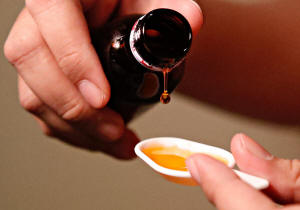Contaminated cough syrup in Africa no longer available - WHO
 Send a link to a friend
Send a link to a friend
 [April 22, 2024]
LONDON (Reuters) - A contaminated batch of Benylin Paediatric
Syrup is no longer available in the African countries where it was sold,
the World Health Organization said on Monday. [April 22, 2024]
LONDON (Reuters) - A contaminated batch of Benylin Paediatric
Syrup is no longer available in the African countries where it was sold,
the World Health Organization said on Monday.
Earlier this month, Nigeria recalled a batch of the children's cough and
allergy medicine after tests found that it contained unacceptable levels
of the toxin, diethylene glycol.
Five other African countries have also pulled the product from shelves -
Kenya, Rwanda, Tanzania, Zimbabwe and South Africa, where the drug was
made.
The recalled batch of Benylin syrup was made by Johnson & Johnson (JNJ.N)
in South Africa in May 2021, although Kenvue (KVUE.N) now owns the brand
after a spin-off from J&J last year.
J&J has referred requests for comment to Kenvue. In an emailed statement
on Friday, Kenvue said it had carried out tests on the batch recalled by
Nigeria and had not detected either diethylene or ethylene glycol, but
was continuing to work with the authorities.
Diethylene glycol can cause acute kidney failure and alongside another
related toxin, ethylene glycol, has been linked to the deaths of more
than 300 children in Cameroon, Gambia, Indonesia and Uzbekistan since
2022 after being found in medicines made in India and Indonesia.
No children have been reported hurt or killed in the latest incident.
[to top of second column]
|

A cough medication is poured in this picture illustration taken
October 19, 2022. REUTERS/Ajeng Dinar Ulfiana/Illustration/File
Photo
 The WHO, which has warned countries
and companies to be vigilant about the ongoing risk of
contamination, said on Friday it was "likely" to issue a broader
alert about Benylin. However, on Monday the health agency said it no
longer had immediate plans to do so after getting more information
at the end of the week.
"Considering that this batch is no longer on the market in any of
the impacted countries and it has been consumed with no apparent
reports of adverse effects, we believe that there is no immediate
public health risk," a spokesperson said by email.
(Reporting by Jennifer Rigby, editing by Ed Osmond)
[© 2024 Thomson Reuters. All rights reserved.]This material may not be published,
broadcast, rewritten or redistributed.
Thompson Reuters is solely responsible for this content. |